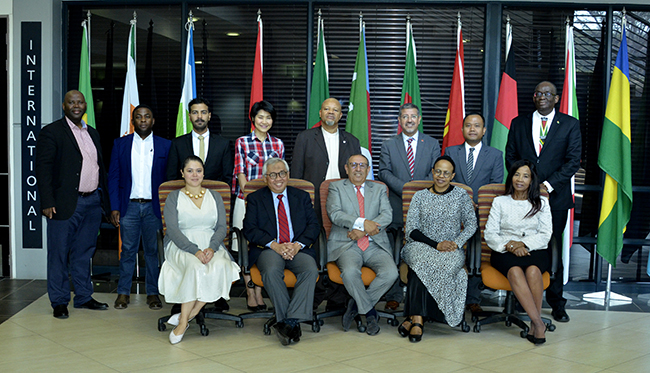
Africa is the continent of the future: These are the words echoed at the Diplomat’s Breakfast held on 29 August 2019 at Unisa which highlighted the importance of sustainable higher education and training in an era when there is a special need to advance cooperation.
In advancing the South-South Cooperation (SSC) and Sustainable Development through higher education and training, the gathering of the diplomatic community engaged further with Unisa on how education can be used in the improvement of the lives of citizens in the south regions.
This is following a similar discussion that was held at Unisa in 2018 which was the beginning of a conversation with the diplomatic community on how to collectively and effectively tap into resources available within developing countries.
Accordingly, Prof Mandla Makhanya, Principal and Vice-Chancellor, stated that “the SSC is a broad framework that aims at advancing cooperation among countries in the Global South in regard to shared challenges around health, welfare, economy and education”.

Front row: Dignitaries from Embassies of Mexico, Indonesia, Morocco, with Prof Thenjiwe Meyiwa, Vice-Principal: Research, Postgraduate Studies, Innovation and Commercialisation and Dr Soane Mohapi from Unisa’s College of Education. Back row: Dr Somadoda Fikeni, Advisor to the Principal with dignitaries from Embassies of Saudi Arabia, Royal Thai, Prof Mandla Makhanya: Principal and Vice Chancellor of Unisa, dignataries from South South Countries as well as the Republic of Guyana.
“It is on the overall a framework that seeks to encourage developing nations to make every effort to take charge of their own destinies – their own aspirations, needs and interests,” said Prof Makhanya.
Prof Makhanya said that the engagement gave a unique opportunity for the South-South region to be able to interrogate the spaces they operate in. “This is in order to begin to claim back the space we as developing countries have occupied effectively for so long.”
He said that while the framework enjoyed the support of the north and other international partners, “it is a platform to develop countries in Africa, Asia, Central America, South America, and the Middle East”.
It was evident in the 45th G7 Summit held on 24 to 26 August 2019 in France, as it pointed Africa’s importance on the global stage. Alluding to the summit, the diplomats highlighted to the reality of Africa being the future of the world and called for meaningful and productive efforts to deal with the future of the continent.
The diplomatic community views Unisa as a platform to be able extend its efforts in helping to integrate the region on issues of governance; the capacitation of women and the young generation; new growth and development models; research; peace and security, especially the threat posed by terrorism; inclusive government systems; and renewed policies which will be supportive to the autonomy of the SSC.
Earlier in the event, Prof Makhanya had urged the diplomatic community, “to come on board and join hands with Unisa in making its vision, to be the African University in the service of humanity, the lived reality”.
It was still the sentiment resonated at the end of the engagement in ensuring university to university collaboration, especially in areas of common interest. “This is why as Unisa we view the SSC as essential in decolonising education, hence its importance in working together, sharing expertise and in sharing in who we are as Africans,” concluded Prof Veronica McKay, Acting VP: Teaching, Learning, Community Engagement and Student Support at Unisa.
Publish date: 2019-09-16 00:00:00.0